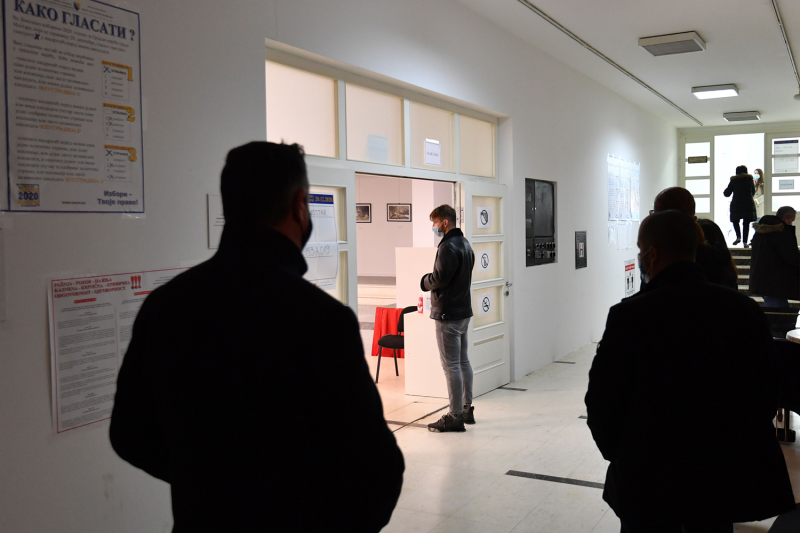Why This Is the Best Time to Sanction Russia

Why This Is the Best Time to Sanction Russia
If Trump were interested in ending the war, he would pressure Putin now.
An oil tanker linked to Russia’s shadow fleet is detained by the Estonian Navy in the Gulf of Finland on April 11. Reuters
For a brief moment, it seemed as though U.S. President Donald Trump were finally willing to get tough on Russia. In an April 26 post on his Truth Social platform, he excoriated Russian President Vladimir Putin for letting his forces bombard Ukrainian civilians despite professed interest in a cease-fire. Trump wrote: “It makes me think that maybe he doesn’t want to stop the war, he’s just tapping me along, and has to be dealt with differently, through ‘Banking’ or ‘Secondary Sanctions?’ Too many people are dying!!!”
But if the mention of additional U.S. sanctions gave rise to hopes of Trump helping to stop Russia’s war, it was not to be. On Sunday, he was back to his familiar ways of easing off on Putin and applying pressure on Ukraine. After the Kremlin proposed yet more negotiations instead of the immediate cease-fire already agreed to by Kyiv, Trump once again backed Putin—adding, for good measure, that “Ukraine should agree to this, IMMEDIATELY.” In so doing, the U.S. president undercut a separate European cease-fire initiative backed up with the threat of new sanctions that the Europeans apparently thought they had coordinated with Washington. Putin is back in the driver’s seat with the White House’s support, it would seem.
For a brief moment, it seemed as though U.S. President Donald Trump were finally willing to get tough on Russia. In an April 26 post on his Truth Social platform, he excoriated Russian President Vladimir Putin for letting his forces bombard Ukrainian civilians despite professed interest in a cease-fire. Trump wrote: “It makes me think that maybe he doesn’t want to stop the war, he’s just tapping me along, and has to be dealt with differently, through ‘Banking’ or ‘Secondary Sanctions?’ Too many people are dying!!!”
But if the mention of additional U.S. sanctions gave rise to hopes of Trump helping to stop Russia’s war, it was not to be. On Sunday, he was back to his familiar ways of easing off on Putin and applying pressure on Ukraine. After the Kremlin proposed yet more negotiations instead of the immediate cease-fire already agreed to by Kyiv, Trump once again backed Putin—adding, for good measure, that “Ukraine should agree to this, IMMEDIATELY.” In so doing, the U.S. president undercut a separate European cease-fire initiative backed up with the threat of new sanctions that the Europeans apparently thought they had coordinated with Washington. Putin is back in the driver’s seat with the White House’s support, it would seem.
If Trump were genuinely interested in pressuring Putin (a dubious assumption, I know), his advisors should tell him that this is the perfect moment to do it. For the past few weeks, the Europeans have shown striking unity and fortitude as they engineered an ultimatum for Moscow: either agree to a cease-fire or get ready for a wide array of new sanctions. (The deadline ended Monday night; lacking U.S. support, the Europeans backed down by extending their ultimatum until Thursday.)
Concerted action will be a crucial test of any new sanctions. But most importantly, the Russian economy is showing new signs of vulnerability that could be exploited by intelligent sanctions that close some of the rather large loopholes of the current regime.
Since Russia launched its full-scale invasion of Ukraine in February 2022, it has been surprisingly successful at keeping its economy humming along—despite the historically unprecedented array of sanctions imposed by Washington and its allies. Yet a growing set of data suggests that Russia’s coping strategy is beginning to show its limits.
On April 25, the Russian Central Bank affirmed that it was keeping its main interest rate at an eye-watering 21 percent—the highest in two decades. Under its redoubtable governor, Elvira Nabiullina, the bank appears determined to stay the course in its long-running effort to contain rising inflation. Nabiullina and her colleagues took the rate decision despite a veiled criticism by Putin, who clearly wanted the bank to lower its prime lending rate. He used a bizarre image to drive home the point, warning unnamed officials against subjecting the economy to “excessive cooling like in a cryotherapy chamber.”
Nabiullina’s determination to stick with the freeze reflects the seriousness of the damage that inflation is wreaking on the Russian economy. The official annual inflation rate is hovering just above 10 percent, but the real figure may be even higher. The main culprit for this high price level is clear: The Kremlin has been pumping vast amounts of money into its war against Ukraine. Last year, the Russian government announced that it was raising defense spending to 6.3 percent of GDP—the highest level since the Cold War. Even that number likely doesn’t capture the full magnitude of expenditures. The rise in inflation means, among other things, that the government will find it difficult to spend its way out of a crisis—something sanctions designers should take into account.
So far, this massive wartime stimulus has helped the Russian economy post strong growth figures since sanctions went into effect in 2022. Nabiullina and the other technocrats who manage day-to-day fiscal and monetary affairs have done a remarkable job of keeping things going. Russian ingenuity in evading the sanctions and finding new markets for its ample oil and gas—above all in China and India—has allowed Putin to keep funding the war at high levels.
Now, though, the good times appear to be coming to an end. Even as inflation remains persistent, growth is stalling, falling from 5 percent in 2024 to an annualized rate of around zero at the start of this year, prompting some observers to warn of stagflation. Many businesses struggle with sinking profits and debts they can’t pay back, prompting some managers to predict a wave of corporate bankruptcies. The labor shortage caused by the defense boom has left private businesses starved for workers. Making the shortage worse, deepening xenophobia has led to mass deportations of Central Asian migrant workers—the very sort of low-cost workers Russia desperately needs at the moment.
Most dangerously for the Kremlin, global oil prices are steadily trending downward, mainly the result of the OPEC+ grouping’s decision to surge production. If oil prices stabilize in the range of $60 to $65 per barrel, Russia may avoid the worst, said Alexandra Prokopenko, a fellow at the Carnegie Russia Eurasia Center. But even then, she added, “large-scale investment and robust growth would remain elusive.” What’s more, the Kremlin has evaded Western sanctions by exporting its oil using a vast fleet of newly purchased tankers operated in ways that make them harder for the West to track. Sanctions experts, who have belatedly built up a comprehensive picture of this so-called shadow fleet, are now working on tactics to target these ships and the ports they operate from—another way in which Russia’s past success also opens up new points of attack.
The Kremlin, in short, is experiencing a moment of acute vulnerability that opens up new opportunities for exerting pressure on Moscow to end the war. Sanctions may not have been as effective as some of their proponents have hoped. But they have indeed caused significant problems for the Russian economy—and new ones could do far more if they are designed to leverage Russia’s weaknesses.
Nicholas Fenton, an associate director at the Center for Strategic and International Studies, argues that the United States and its allies should seize the moment by embarking on a coordinated campaign to cut Russian exports and encourage capital flight. In November 2024, the West imposed a series of sanctions on several important Russian banks. In a matter of days, the ruble lost 15 percent of its value. The main drawback of the sanctions imposed to date, Fenton said, has been their gradualism—what he calls a “boil the frog” approach. “Acute pressure over a shorter period might give us stronger results than a building pressure over a longer period of time,” he said.
Some of Russia’s most important oil and gas companies remain largely unsanctioned, including megacorporations such as Gazprom, Lukoil, and Rosneft. Freezing these companies’ overseas accounts could take tens of billions of dollars out of play for the Russians, said Nataliia Shapoval, the head of policy research at the Kyiv School of Economics. Imposing secondary sanctions on any companies or individuals doing business with them would make it far harder for Moscow’s oil majors to do business.
And for that matter, why stop at oil? U.S. Sen. Lindsey Graham claims to have found widespread support for a Senate bill that would ratchet up sanctions on Russia. According to the Wall Street Journal, Graham wants to impose a 500 percent tariff on goods imported from any country that buys Russian oil, gas, uranium, and other natural resources.
The Trump White House is usually quick to discipline lawmakers who push policies viewed as contrary to the president’s agenda. So far, though, Graham has experienced zero pushback. Is that reason for hope that Trump might be willing to get tough on his friend Putin, despite his latest U-turn on sanctions? If so, this would be the time.
This post is part of FP’s ongoing coverage of the Trump administration. Follow along here.
Christian Caryl is the former Moscow bureau chief for Newsweek and U.S News & World Report. He has reported from over 60 countries, and is the author of Strange Revels: 1979 and the Birth of the 21st Century (Basic Books, 2014). X: @ccaryl
More from Foreign Policy
-

Indian Air Force personnel stand in front of a Rafale fighter jet during a military aviation exhibition at the Yelahanka Air Force Station in Bengaluru. A Tale of Four Fighter Jets
The aircraft India and Pakistan use to strike each other tell a story of key geopolitical shifts.
-

A cardinal in a black robe with red sash with hands folded in front of him walks past a stage and steps. Conclave Sends Message With American Pope
Some cardinals had been agitating for U.S. leadership to counter Trump.
-

An illustration shows red tape lines crossing over and entrapping a semiconductor chip. Is It Too Late to Slow China’s AI Development?
The U.S. has been trying to keep its technological lead through export restrictions, but China is closing the gap.
-

A man watches a news program about Chinese military drills surrounding Taiwan, on a giant screen outside a shopping mall in Beijing on Oct. 14, 2024. The Pentagon Fixates on War Over Taiwan
While U.S. military leaders fret about China, Trump has dismissed the Asia-Pacific.








Join the Conversation
Commenting on this and other recent articles is just one benefit of a Foreign Policy subscription.
Already a subscriber?
.
Subscribe
Subscribe
View Comments
Join the Conversation
Join the conversation on this and other recent Foreign Policy articles when you subscribe now.
Subscribe
Subscribe
Not your account?
View Comments
Join the Conversation
Please follow our comment guidelines, stay on topic, and be civil, courteous, and respectful of others’ beliefs.
Change your username |
Log out
Change your username:
CANCEL
Confirm your username to get started.
The default username below has been generated using the first name and last initial on your FP subscriber account. Usernames may be updated at any time and must not contain inappropriate or offensive language.